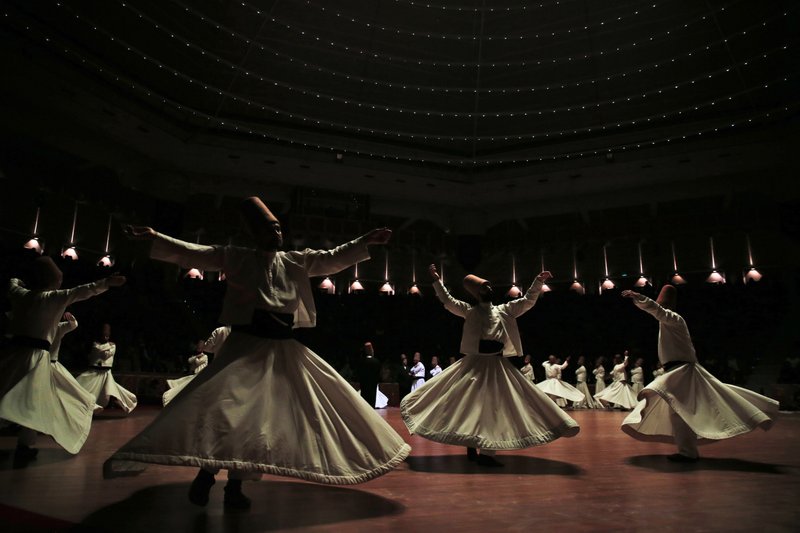In Hakaza Takalam Ibn Arabi (That’s How Ibn Arabi Spoke, Al-Markaz Al-Thaqafi Al-Arabi, 2004) Nasr Hamid Abu Zeid writes,”It’s difficult for any Muslim to separate in his religious experience between the spiritualities and logical fundamentals that gradually create his religious conscious.” Abu Zeid’s statement is an important one for Sufis.
Abu Zeid explains how he, like his fellow villagers, grew up watching Sufi practices as part of the village’s daily rituals, where the talk of prophets and supernatural gifts of the awlia(blessed ones) and hadrat al-zikr (assembly of remembrance) were held every Thursday night. The grown ups would stand in a circle and move side to side while chanting religious songs led by the sheikh of the hadra. Then gradually they sped up their movement, almost dancing, as it became impossible to understand the chants.
Sufis are often referred to as the “dervishes,” “masters,” “the near ones,” or “the people of the truth” because of the significant spiritual impact they have had on the Arab world. Most originate in Tunisia, Algeria and Morocco, but the Sufi movement first flourished in Egypt during the Mamluk era. Their renowned modesty, emphasis on spirituality, rejection of of materialism and earthly matters, and eternal quest to purify their souls in reach of the utmost truth, attracted and continue to attract millions of followers worldwide.
But according to Abdel Hadi Al-Qasabi, the current Sheikh of the Supreme Council of Sufi orders, Sufism is much older. “The first Sufi path/order was that of al-Muhammadiah,” says Al-Qasabi, esplaining that Sunni Islam and Sufism are different paths on the same route. “Sufism is derived from saffa or purifying one’s soul, others view it as a science of ethics, I say it is holding on to God’s book and the path of his prophet, while aiming at the correction of the human being.”
There are more than 70 Sufi orders, each following a different Sufi wali (disciple). The followers visit the wali‘s tomb annually and conduct zikr circles. Though Muslim Sufi festivals include zikr circles and religious seminars, they also have a secular side. These festivals include all types of street vendors as well as independent artisans who come to display their work.
With some 15 million followers in Egypt, Sufism has always been important to people here. According to researcher Abul Fadl el-Isnawi’s 2008 study on the Sufi orders in Egypt, people are attracted to Sufism’s powerful spirituality and wisdom. “They provide financial support for their muridin that are usually beyond the poverty line, ambulance cars, cars to transport the dead, cemeteries, and kuttabs for Muslims to recite the Quran,” el-Isnawi explained.
Hassan el-Musalami, a professor of agriculture at Zagazig University, has been the sheikh of the Musalami Sufi order since 1983. He manages to rule the order he accustomely inherited from his father. “There are rules for inheriting the order,” el–Musalami explains. It is passed to the eldest son if he is declared competent by a selected committee headed by the supreme sheikh of the Sufi council, where he proves his full knowledge of Sufi ways, and the Holy Quran.” If the eldest son is rejected, his brother, or cousin or any male relative that shares his family name becomes a candidate.
Each Friday, el-Musalami, opens his guest house and receives people who come to ask his advice or help. El-Musalami’s order dates back 900 years, when Salim Abu Musalam came to Egypt from Iraq. Abu Musalam, who lived to 112, was an influential religious leader whose disciples supported King Saleh Ayoub in his battles against the Tatar.
“There is no clash and there should be no clash between Sunnis and Sufis simply because Sufis foundation lies on the fact that they follow God’s orders and Prophet Mohamed’s teaching, and possess deep respect and love for the Prophet Mohamed’s descendants,” says el-Musalami. “Why should that clash with any of the Sunnis? We hold religious ceremonies as a love attribute to God and serve needy people food, support them financially.”
According to Isnawi’s study, Sufi orders are valued and loved, but people are reluctant to formally join the orders. While 16.6 percent of Isnawi’s sample were members of a Sufi order, 8.3 percent believed Sufi orders go against Islam and 11.6 percent said they think Sufis are con artists.
“Sufi rituals makes Sunnis nowadays a bit skeptical,” notes Isnawi. “At first they greet the tombs of the awlais, by kissing them, they plea for them to ask God’s blessing, while in Islam there is no medium between God and his worshipper.” Moreover, the ecstatic zikr rituals make people suspicious and many Sufis believe that sheikhs have supernatural powers.
“The status of the Sufis haven’t changed, it’s the society that changed,” says renowned novelist Gamal el-Ghitani, who often puts Sufi symbolism in his literature.
“In a deeper cultural sense, Sufism in Egypt, solves a deep problem with regard to Egyptian culture and the foreign one,” el-Ghitani says, explaining that when Islam arrived in Egypt, Sufism was the ideal form of tolerant religion.
“Sufism in Egypt is not the same as in Riyadh, for example,” says el-Ghitani. “The problem is in the past 30 years when the fundamentalist Islamic trends surfaced in Egyptian society, mostly from the Gulf region, the struggle between them and the Sufis began especially when they viewed Sufism as an act of blasphemy.”
Though they are known as peaceful people, Sufis have always been on the front lines of resistance against foreign invasion. “In the whole of North Africa, the leaders of resistance movements against imperialism were Sufis,” notes el-Ghitani. “In Egypt, Shiekh Ahmed El-Badawi was affiliated with the jihad against the crusaders.”
Though female descendants of Sufi walis do not inherit their status, salihat (pious women) hold an important place in Sufi culture. From Sayyeda Zeinab, the granddaughter of the Prophet Mohamed whose mosque in Islamic Cairo is the refuge of the needy and the weak, to that sacred tomb of el-Seit Aziza, daughter of a founding Sufi in the village of Akhmeim in Sohag Governorate, the salihat have their share of sainthood.
“In the early 1950s, Egypt’s President Gamal Abdel Nasser used Sufis as his allies against fundamentalist Islamic movement,” writes Insawi. “President Anwar el-Sadat issued their first Sufi magazine in the 1970s and they were the first to condemn Sadat’s assassination as an act of terrorism.” Insawi emphasizes that currently Sufis hold high positions in a number of fields. “The Sufi impact in parliamentary elections is great. I personally know of three members of the Shura Council who succeeded in the election because of the Sufi vote,” Insawi says.



